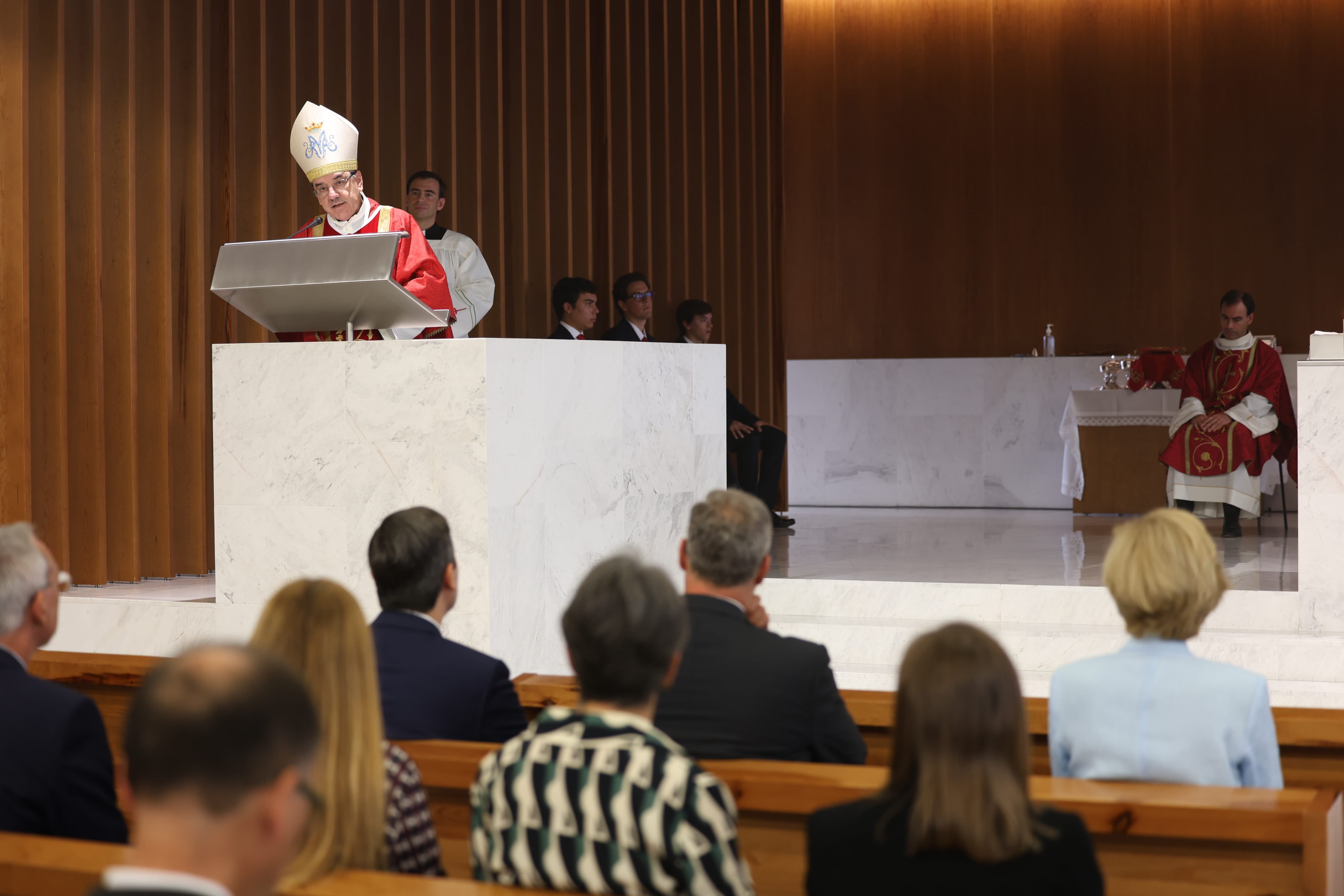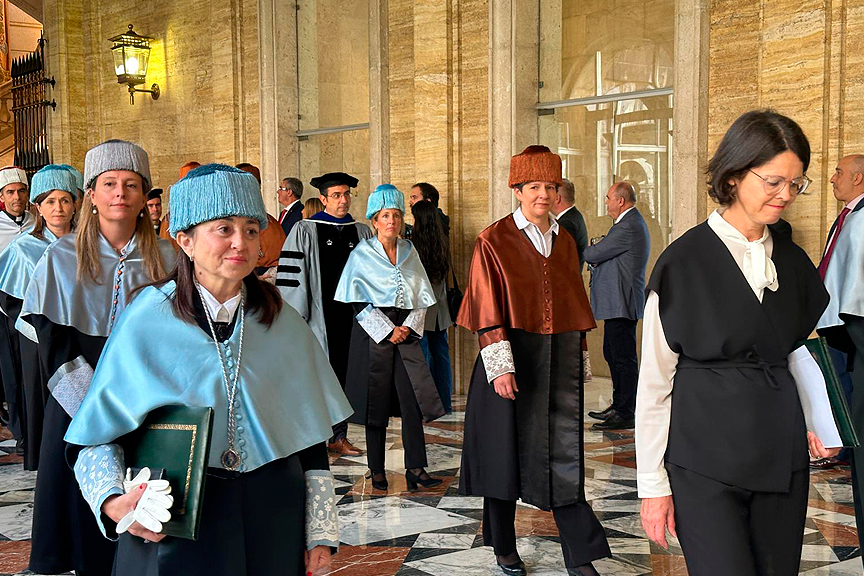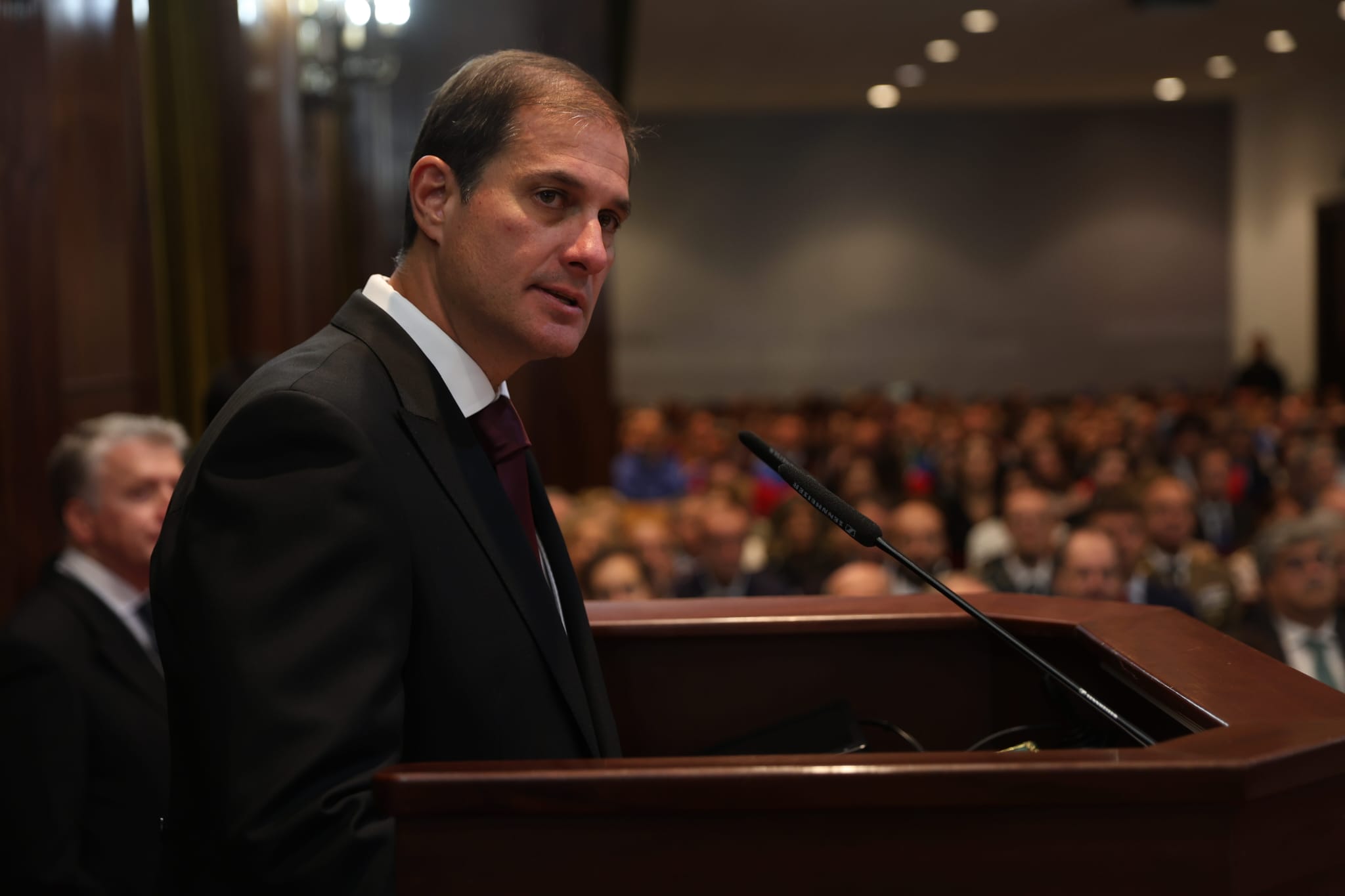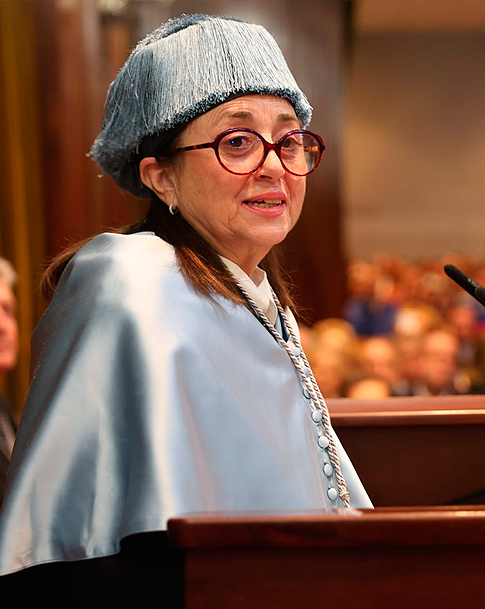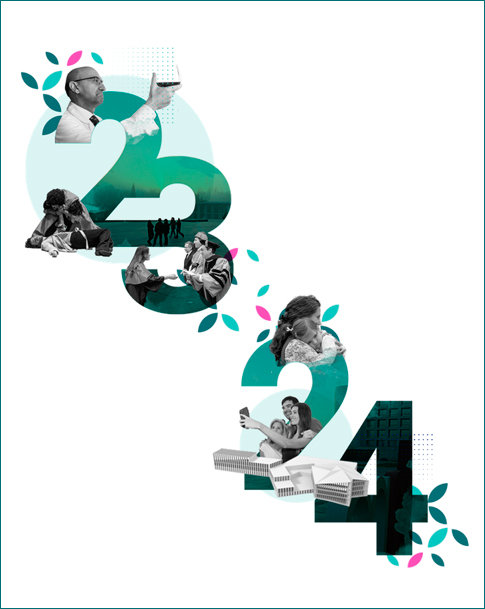"Perhaps now more than ever, we need proposals that, in dialogue with society, bring the knowledge and the reliability of the research to the citizens, as well as a humanistic outlook and ethical commitment". This was stated by the president of the University of Navarra, María Iraburu, during the official opening of the 2024-25 academic year, a ceremony that brought together the highest authorities, as well as professors and students, at the classroom Magna.
The president referred to the urgent need to "transfer knowledge" , one of the aspects core topic for the University to carry out its mission statement service to society. "Initiatives that build, that stimulate the desire to be informed and educated, that make present the universal character of knowledge, art, beauty, science, love of nature," she added.
One of these initiatives, according to María Iraburu, is the future of the company, which is already under construction. BIOMA Centeralready under construction, which "will be a space for meeting with society, where people of all ages, and especially young people, will ask questions, analyze ideas and opinions with an open mind, and discover new horizons".
The other fundamental piece of that service task is the students, who constitute "an active and fundamental part of the university community," stressed president."Our service to society depends on those students arriving and encountering a truly transformative academic environment. They are the ones who question our approaches, ask us risky questions, help us think, bring out - at final- the best of ourselves," she added. At this point, María Iraburu recalled that one of the great challenges of the University "is to broaden the channels so that any student with the illusion of being educated in this way can do so, regardless of their economic situation" status .
When the dimension of service is genuine and is present in the daily work , according to Professor Iraburu, it is recognized by three characteristics. Firstly, sensitivity to the needs of people and the environment: "A lively attitude of service is characterized by an interest in the challenges and problems that surround us, by the ability to detect opportunities where others only see threats. Secondly, "the willingness to make life difficult for ourselves", since "experience tells us that every ambitious project encounters resistance and difficulties, and succeeds because of the imposition of people who do not consider tranquility as the only goal".
And finally, the ability to unite wills and efforts, through "an invisible solidarity" that unites those who seek the common good in any form and are willing to work whatever it takes to achieve it. "The desire to serve thus becomes, inwardly, a university-building force, helping to overcome the inevitable differences and disagreements inherent in the daily work . And outwardly, it connects us with very diverse people and entities, convinced that together, we can all go further".
The president ended her speech with some words of St. Josemaría Escrivá, in 1972, speaking of the University: "It thus contributes with its universal work to remove barriers that hinder the mutual understanding of men, to lighten the fear of an uncertain future, to promote -with the love of truth, justice and freedom- true peace and harmony of spirits and of nations". "How relevant can our daily work be when it understands itself in the horizon that these words outline!. With the financial aid of God and of those who preceded us, we face the new course 2024-25 ready to be those people who, with their work at the service of others, eliminate barriers, favor understanding, lighten fear and promote peace."
"A lively attitude of service is characterized by an interest in the challenges and problems that surround us, by the ability to detect opportunities where others only see threats".

"Experience tells us that every ambitious project encounters resistance and difficulties and moves forward because of the impulse of people who do not consider tranquility as the only goal".
AUTHORITIES
The event was attended by the first authorities, including María Chivite, president of the Government of Navarra; Unai Hualde, president of the Parliament of Navarra; Ana Ollo, second vice-president and councilor of report and Coexistence, External Action and Basque; Patricia Fanlo, councilor of University, Innovation and Digital Transformation; Amparo López Antelo, councilor of Interior, Public Function and Justice; Carlos Gimeno, councilor of Education; Fernando Domínguez, councilor of Health; Florencio Roselló Pérez, archbishop of Pamplona and bishop of Tudela; Jaime Goyena, senior prosecutor of Navarra; the President of the Public University of Navarra, Ramón Gonzalo; the director of the UNED Pamplona, Teresa Imízcoz; as well as the president of the committee of Navarra, José Luis Goñi; the president of the Chamber of Comptos, Ignacio Cabeza del Salvador; and representatives of the political parties of the parliamentary arc and of different cultural and professional fields .
After a Mass at chapel of Amigos Building, officiated by the Archbishop of Pamplona, Mons. Florencio Roselló, the opening ceremony began with the parade of the academic procession, in which more than 200 doctors participated. position The musical part of the Mass and the parade was performed by the choir of the seminar International Bidasoa. Already in the classroom Magna, the University Secretary, Jesús María Ezponda, read the summary of the academic report of the academic year 23-24, and then, the professor of the School of Nursing Navidad Canga gave the inaugural lecture, under the degree scroll "Creating health wherever our daily life takes place".
Inaugural lesson: "Creating health" is everyone's responsibility
In her speech, Professor Navidad Canga reflected on the concept of "creating health" in our daily lives: "This concept moves away from the traditional pathogenic vision, that is, the one focused on the causes of diseases, and approaches a positive salutogenic view, emphasizing the origin of health and not the origin of the disease". From this approach, he stressed, health is not only the responsibility of the health system, but a task shared by all: "Today we are facing problems such as loneliness, stress, obesity, poverty and addictions, which cannot be tackled solely from a health response".
In his opinion, we all have responsibilities towards our own health and that of our families. It is necessary to abandon the passive role and assume "a greater protagonism, in the face of a model that has often acted and continues to act in a paternalistic manner," he stressed.
On the one hand, he pointed out, this concept includes the individual dimension oriented to self-care, which must meet five essential characteristics: balanced nutrition, regular physical activity, healthy sleep patron saint , avoiding risky behaviors such as tobacco and alcohol consumption, and, finally, generating meaningful ties with family, friends and the community. And on the other hand, the contextual dimension, which involves improving domestic, educational, work and community environments.
With regard to the health sector, Professor Navidad Canga stressed that it is going through a great crisis and there is an "urgent need to introduce changes", especially at the first level or Primary Health Care (PHC). In her opinion, this is the level of care best positioned to introduce this new Philosophy of "creating health", since it is integrated into the local fabric of the communities, and is therefore very receptive and sensitive to their needs.
In fact, according to her, "80% of the population's health needs and problems should be covered or solved at the first level of attendance; however, the budgets allocated to PHC are not enough to guarantee a quality service". The implementation of a approach oriented to health creation has not been generalized and nevertheless, concluded the professor, "the urgency to act is imperative" to face the problems of the Health System.
